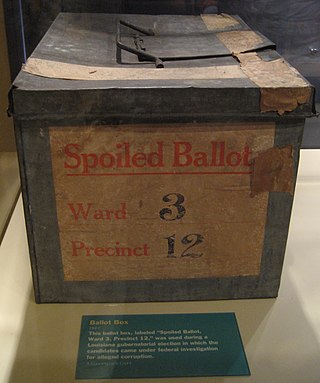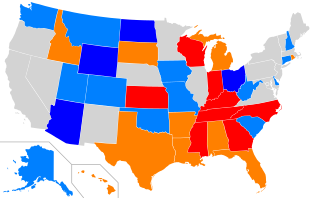
A referendum is a direct vote by the electorate on a proposal, law, or political issue. This is in contrast to an issue being voted on by a representative. This may result in the adoption of a new policy or specific law, or the referendum may be only advisory. In some countries, it is synonymous with and also known as plebiscite, votation, popular consultation, ballot question, ballot measure, or proposition.
The electoral system of Australia comprises the laws and processes used for the election of members of the Australian Parliament and is governed primarily by the Commonwealth Electoral Act 1918. The system presently has a number of distinctive features including compulsory enrolment; compulsory voting; majority-preferential instant-runoff voting in single-member seats to elect the lower house, the House of Representatives; and the use of the single transferable vote proportional representation system to elect the upper house, the Senate.

Compulsory voting, also called universal civic duty voting or mandatory voting, is the requirement that registered voters participate in an election. As of January 2023, 21 countries have compulsory voting laws. Law enforcement in those countries varies considerably and the penalty for not casting a ballot without a proper justification ranges from severe to non-existent.
In political science, voter fatigue is a cause of voter abstention which result from the electorates of representative democracies being asked to vote often, on too many issues or without easy access to relevant information. Voter fatigue can be a symptom of efforts that make voting more difficult that some describe as voter suppression, which changes the voting rules and environment in such a way that turnout decreases as the cost of voting increases.

A protest vote is a vote cast in an election to demonstrate dissatisfaction with the choice of candidates or the current political system. Protest voting takes a variety of forms and reflects numerous voter motivations, including political apathy. Where voting is compulsory, casting a blank vote is available for those who do not wish to choose a candidate, or to protest. Unlike abstention elsewhere, blank votes are counted.

In political science, voter turnout is the participation rate of a given election. This is typically either the percentage of registered voters, eligible voters, or all voting-age people. According to Stanford University political scientists Adam Bonica and Michael McFaul, there is a consensus among political scientists that "democracies perform better when more people vote."

"Get out the vote" or "getting out the vote" (GOTV) describes efforts aimed at increasing the voter turnout in elections. In countries that do not have or enforce compulsory voting, voter turnout can be low, sometimes even below a third of the eligible voter pool. GOTV efforts typically attempt to register voters, then get them to vote, by absentee ballot, early voting or election day voting. GOTV is generally not required for elections when there are effective compulsory voting systems in place, other than perhaps to register first time voters.

Voter suppression is a strategy used to influence the outcome of an election by discouraging or preventing specific groups of people from voting. It is distinguished from political campaigning in that campaigning attempts to change likely voting behavior by changing the opinions of potential voters through persuasion and organization, activating otherwise inactive voters, or registering new supporters. Voter suppression, instead, attempts to gain an advantage by reducing the turnout of certain voters. Suppression is an anti-democratic tactic associated with authoritarianism.

Elections in Egypt are held for the president and a bicameral legislature. The president of Egypt is elected for a six-year term by popular vote after draft amendments to the 2013 constitution altered the presidential term limits from the original four years to six years.
Sir David Edgeworth Butler was an English political scientist who specialised in psephology, the study of elections. He has been described as "the father of modern election science".
Youth suffrage is the right of youth to vote and forms part of the broader universal suffrage and youth rights movements. Most democracies have lowered the voting age to between 16 and 18, while some advocates for children's suffrage hope to remove age restrictions entirely.
An election boycott is the boycotting of an election by a group of voters, each of whom abstains from voting. Boycotting may be used as a form of political protest where voters feel that electoral fraud is likely, or that the electoral system is biased against its candidates, that the polity organizing the election lacks legitimacy, or that the candidates running are very unpopular. In jurisdictions with compulsory voting, a boycott may amount to an act of civil disobedience; alternatively, supporters of the boycott may be able to cast blank votes or vote for "none of the above". Boycotting voters may belong to a particular regional or ethnic group. A particular political party or candidate may refuse to run in the election and urges its supporters to boycott the vote.

Voter turnout in US elections is measured as a percentage, calculated by dividing the total number of votes cast by the voting age population (VAP), or more recently, the voting eligible population (VEP). Voter turnout has varied over time, between states, and between demographic groups. In the United States, turnout is higher for presidential elections than for midterm elections. US turnout is generally lower than that in other advanced democracies.
Criticism of democracy, or debate on democracy and the different aspects of how to implement democracy best have been widely discussed. There are both internal critics and external ones who reject the values promoted by constitutional democracy.

Election day or polling day is the day on which general elections are held. In many countries, general elections are always held on a Saturday or Sunday, to enable as many voters as possible to participate; while in other countries elections are always held on a weekday. However, some countries, or regions within a country, which hold elections on a weekday declare election day a public holiday. Countries which permit absentee ballots, early ballots or postal votes to be cast by mail before the election avoid the problem altogether by enabling voters to vote on a day that is more convenient to them.
Clientelism or client politics is the exchange of goods and services for political support, often involving an implicit or explicit quid-pro-quo. It is closely related to patronage politics and vote buying.

Voter ID laws in the United States are laws that require a person to provide some form of official identification before they are permitted to register to vote, receive a ballot for an election, or to actually vote in elections in the United States.

Jason F. Brennan is an American philosopher and business professor. He is the Robert J. and Elizabeth Flanagan Family Professor of Strategy, Economics, Ethics, and Public Policy at the McDonough School of Business at Georgetown University.

Against Democracy is a book by American political philosopher Jason Brennan. It contains the writer's critical perspectives on democracy, a form of government in which the rights to rule are evenly given to every citizen, and argues for its replacement by the more limiting epistocracy, where such rights are achieved by the knowledgeable. The book was published on September 6, 2016 by Princeton University Press and has been translated into other languages. The German translation, Gegen Demokratie, published the next year, became a Der Spiegel bestseller.

Elections to the European Parliament saw declining voter turnout between 1979 and 2014. However, voter turnout in 2019 European elections increased by 8 points compared to 2014. In spite of this exception for all Member States, the electoral mobilization remains weak compared to the national parliamentary elections. Moreover, turnout significantly differs from one country to another in Europe and across a time: in 2019 Belgium citizens participated the most with 88.47% and Slovakians the least with 22.74%. The potential factors that might influence these trends and their implications have attracted great scholarly attention. Identifying and analysing the factors that determine the relative low turnout at European elections is therefore critical, as it is one element that weakens the democratic legitimacy of the European Parliament.













